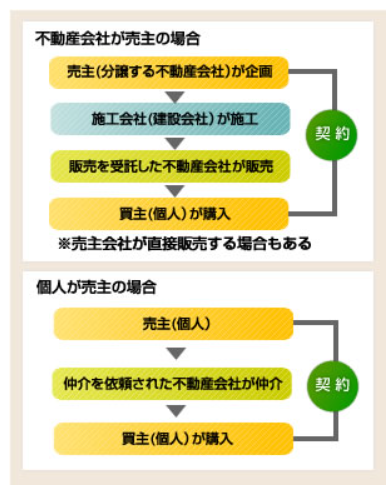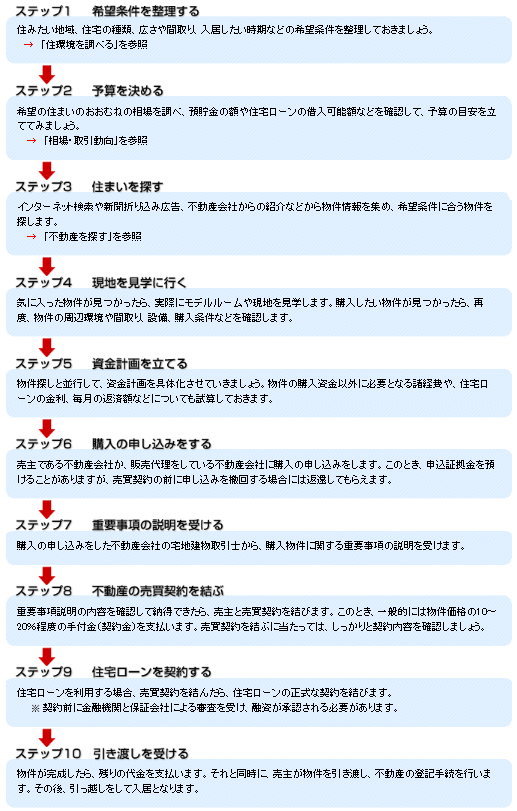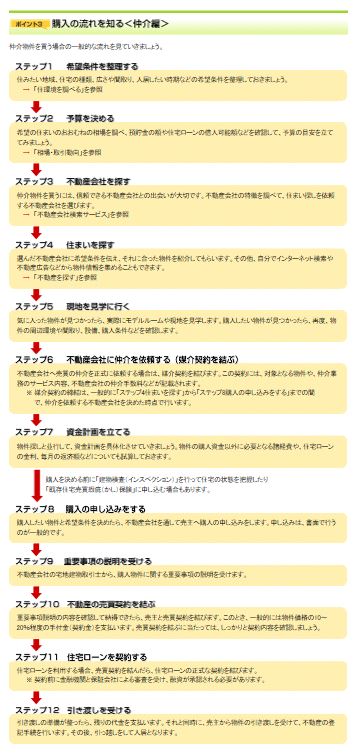Buying a House: the Process of Buying a HouseOnce you have decided to buy a house, it is helpful to know what the process is before moving in so that you can plan ahead. Point 1: Difference between a House for Sale and Brokerage There are two main types of housing sales: for sale and brokerage. This changes the purchase process. (1) Property for sale This is a property purchased directly from the real estate company that is the seller. (It may also be purchased through a real estate company that has been commissioned by the seller to act as a sales agent.) Generally, newly built condominiums and newly built single-family homes with a large number of units for sale are properties for sale. (2) Property for brokerage This is a property purchased through a real estate company that has received a request from the seller to act as an intermediary. Generally, newly built detached houses and used properties with a small number of units for sale are agency properties. In the case of properties for brokerage, a brokerage fee may be charged to the real estate company, which must be confirmed in advance. When a real estate company is the seller The seller (the real estate company selling the property) plans ↓ A contractor (construction company) builds a house ↓ A real estate company entrusted with the sale sells the house ↓ A buyer (individual) purchases the house *In some cases, the seller buys and sells directly. ⇒ The seller (the real estate company selling the property) ⇕ Contract the buyer (individual) When an individual is the seller The seller (an individual) ↓ A Real estate company requested to act as an intermediary mediates the sale . ↓ A buyer (individual) purchases the house ⇒ The seller (an individual) ⇕ Contract A buyer (individual) Point 2: The Purchase Flow of a House for Sale The following is the general flow for purchasing a house for sale. *Please see point 3 for purchasing a house for brokerage, including a newly built house. Step 1 List up your preferences List up your preferences such as the area you want to live, the type of housing, the size and layout of the house, and when you want to move in. ⇩ Step 2 Set a budget Check the approximate market price of a house you are considering to buy, the amount of your savings, and the amount you can borrow for a mortgage, and establish a rough estimate of your budget. ⇩ Step 3 Look for a house Gather property information from Internet searches, newspaper inserts, referrals from real estate agencies, and other sources to find properties that match your preferences. ⇩ Step 4 Visit the site Once you find a property you like, you can actually visit the model home or the site. Once you have found the property you wish to purchase, you will again check the property's surroundings, floor plan, facilities, purchase terms, etc. ⇩ Step 5 Make a financial plan In parallel with the property search, concretize your financial plan. In addition to the funds needed to purchase the property, estimate the various expenses, mortgage interest rates, and monthly repayments that will be required. ⇩ Step 6 Make a purchase offer The seller, a real estate company, makes a purchase offer to the real estate company acting as a sales agent. At this time, an application deposit may be required, but it will be returned if the application is withdrawn before the sales contract is signed. ⇩ Step 7 Receive an explanation of important matters You will receive an explanation of important matters concerning the property to be purchased from the real estate transaction agent of the real estate company where you applied for the purchase. ⇩ Step 8 Sign a real estate sales contract If you confirm the contents of the explanation of important matters and are satisfied with it, you conclude a sales contract with the seller. At this time, a deposit (contract fee) of approximately 10% of the property price is generally paid. When signing the sales contract, make sure you have a clear understanding of the terms and conditions of the contract. ⇩ Step 9 Sign a mortgage loan When using a mortgage loan, sign a formal contract for a mortgage loan following the signing of the sale contract. *Prior to signing the contract, the loan must be reviewed and approved by the financial institution and guarantee company. ⇩ Step 10 The delivery of the property Upon the completion of construction, the remaining payment is made. At the same time, the seller will deliver the property and complete the real estate registration procedures. After that, you will move in. Point 3: The Purchase Flow of a House for Brokerage The following is the general flow for purchasing a house for brokerage. Step 1 List up your preferences List up your preferences such as the area you want to live, the type of housing, the size and layout of the house, and when you want to move in. ⇩ Step 2 Set a budget Check the approximate market price of a house you are considering to buy, the amount of your savings, and the amount you can borrow for a mortgage, and establish a rough estimate of your budget. ⇩ Step 3 Find a Real Estate Agency To buy a house for brokerage, it is important to find a reliable real estate agency. Look into the real estate agency's listings and choose the real estate agency you would like to request to find a house. ⇩ Step 4 Look for a house Let the real estate agency you have chosen know your preferences and ask them to refer you to properties that match your preferences. You can also gather property information from Internet searches and real estate advertisements on your own. ⇩ Step 5 Visit the site Once you find a property you like, you can actually visit the model home or the site. Once you have found the property you wish to purchase, you will again check the property's surroundings, floor plan, facilities, purchase terms, etc. ⇩ Step 6 Request a real estate agency to mediate (sign a brokerage contract). When formally requesting mediation of sales to a real estate agency, a brokerage contract is concluded. In this contract, the subject property, the service details, and the real estate agency's fee will be described. *A brokerage contract is generally concluded between "Step 4 Look for a house" and "Step 8 Make a purchase offer" when you decide on a real estate agency to request mediation. ⇩ Step 7 Make a financial plan In parallel with the property search, concretize your financial plan. In addition to the funds needed to purchase the property, estimate the various expenses, mortgage interest rates, and monthly repayments that will be required. *Before finalizing the purchase of a house, a building inspection may be conducted to ascertain the condition of the house. You may need to purchase an "existing house sales defect insurance. ⇩ Step 8 Make a purchase offer Once you have decided on the property you wish to purchase and your desired conditions, make an purchase offer to the seller through the real estate agency. Applications are generally made in writing. ⇩ Step 9 Receive an explanation of important matters You will receive an explanation of important matters concerning the property to be purchased from the real estate transaction agent of the real estate company. ⇩ Step 10 Sign a real estate sales agreement If you confirm the contents of the explanation of important matters and are satisfied with it, you conclude a sales contract with the seller. At this time, a deposit (contract fee) of generally 10-20% of the property price is paid. When you sign a sales contract, make sure that you have thoroughly reviewed the terms of the contract. ⇩ Step 11 Sign a mortgage loan When using a mortgage loan, sign a formal contract for a mortgage loan following the signing of the sale contract. *Prior to signing the contract, the loan must be reviewed and approved by the financial institution and guarantee company. ⇩ Step 12 The delivery of the property
When the property is ready for delivery, the remaining payment is made. At the same time, the property is handed over from the seller and the property is registered. You will then move in Comments are closed.
|
Details
AuthorArrows International Realty Corp. Archives
June 2023
Categories
All
|






 RSS Feed
RSS Feed